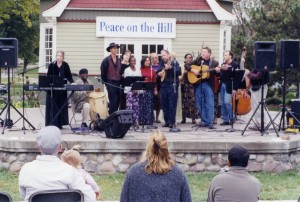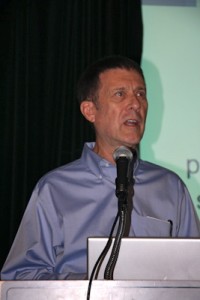#932 – Dick Bernard: International Day of Peace, September 21, 2014
(click to enlarge)
Eleven years ago, sometime in August, 2003, a group of peace and justice folks at Minneapolis’ First Unitarian Society had an idea: let’s do a Peace Day at Loring Park on the International Day of Peace, September 21. Their plan involved enlisting churches in the downtown Minneapolis neighborhood.
I volunteered.
“Peace Day”? September 21?
It wasn’t until later that I learned of Jeremy Gilley, a young Englishman, who had done the inconceivable: an ordinary citizen convincing the United Nations to fix a specific date for its annual International Day of Peace as September 21 each year, rather than the third Tuesday in September, or even other dates, which had been the practice since the day was established at the United Nations in 1981.
The first Peace Day observed on September 21 had been the previous year, 2002. Somebody in the Twin Cities had heard about it, and here we were: planning one for the Twin Cities in its second year, 2003.
(NOTE: Sunday, September 21, 2014, is this years International Day of Peace. The complex and fascinating story of Peace Day is told in a free 80 minute on-line movie, “The Day After Peace”, accessible here.)
By September, 2003, I had become active in the peace and justice committee at Basilica of St. Mary, one of the downtown churches, and I agreed to help out with the Peace Day event, which came to be called “Peace on the Hill” (First Unitarian is, in fact on Lowry hill, a couple of blocks up from Loring Park).
As I recall, the committee was having trouble finding somebody to be a speaker.
On the day itself, Sep. 21, 2003, the weather was uncertain, and maybe a couple of hundred of us gathered in a circle, some local musicians inspired us (photo above), and then-Minneapolis Mayor R.T. Rybak came at the last minute and gave a very good speech. He had made a special trip to the event as this was his wedding anniversary weekend, and they had made other plans.
Peace on the Hill was a very good event, and my friend Madeline Simon, and her colleagues at First Unitarian, deserve the credit for a very good idea. (My personal thoughts, written a few days after the event, are at the end of this post.) I still have the t-shirt from the day: Peace Day 9-21-03001
Events like Peace on the Hill are difficult to put together, and it is even more difficult to sustain interest. So, to my knowledge, the first day was also the last. There were other efforts, but they were only sporadic and scattered.
Assorted “bugaboos” known to anyone who has ever organized anything interfere with long term success.
There were plenty of reasons for Jeremy Gilley to give up on his noble idea of a specific day set aside for peace.
By tragic irony, the United Nations adopted September 21 as the International Day of Peace on September 7, 2001, effective in 2002.
Four days later, on September 11, 2001, as the UN was celebrating the 2001 International Day of Peace, outside, on a pleasant day, the Twin Towers just down the street from the UN were hit.
It all could have ended, then and there. But it didn’t.
From all indications, in 2014, Jeremy Gilley has the focus and the momentum. His goal now, and it’s an attainable one, is that 3 billion people, half of the worlds population, will be aware of September 21 as the International Day of Peace.
Simple awareness is a large step towards victory.
Watch the movie, and commit to do something this International Day of Peace, and every day following.
*
POSTNOTE: Thoughts written after International Peace Day September 21, 2003.
Dick Bernard, September 29, 2003, P&J #460 “Who’ll be speaking?”
Note especially the bold-faced section beginning at #4.
A suggestion: I am reading a little book, and near the beginning was a paragraph which caught my eye:
“…if we so choose, we can always postpone the jump from thought to action. We really need to acquire more information, read another book, attend one more conference, hold further conversations, in order to “clarify the issues.” Then we’ll act. So if the action looks risky, there is always a good reason to postpone it: we don’t know enough yet.
“We are fooling ourselves: we never actually “postpone” the jump from thought to action. For, paradoxical as it sounds, not to act is to act. It is to act by default for whoever is in charge. People who did not oppose the Nazi gassing of Jews were supporting the Nazis: “See,” Hitler could say, “nobody is objecting.”….”
(From Unexpected News: Reading the Bible with Third World Eyes, by Robert McAfee Brown. Check it out.)
What to do?
Some Actions among many we all can easily take:
1. Actually write a real letter to your Congressperson and Senators and editor, etc., about the $87,000,000,000 and the additional immense deficits. Make it brief and to the point. It will be read by somebody, and they will pay attention.
2. Do something for Peace and Justice YOU consider to be a bit outrageous – outside of your comfort zone, even if only a little. That is the only real way to get into action…to be at least a little uncomfortable. For sure don’t be stymied by a need to know everything (see the book quote above). As we are becoming more and more aware, the “big deals” probably know less than we do – yes, they may have more information, but their “blind spots” are huge – their ego causes them to miss the obvious…and then deny its existence long after it is obvious to others.
3. Pay much more attention to today’s quiet masses than to the loudmouths. I think the quiet multitude among us – the vast majority – is starting to wonder if Iraq, the economy, etc makes any sense. In a sense, they might be like the ordinary passengers on the Titanic who might have been on deck and wondering about those icebergs out there, but said to themselves “they must know what they’re doing”, and expressed concern to nobody. Of course, “they” up on the bridge of the unsinkable Titanic apparently didn’t have a clue, and the Titanic sank on its maiden voyage. We are, collectively, on our own Titanic…. There is a temptation – I feel it myself – to say “see, I told you so”. Avoid the temptation. The nature of humans is to not want to admit they’ve been wrong.
4. Make a commitment to SUPPORT activities in your area that SOMEBODY like you is investing a lot of time, personal effort and even money in to make a success. Attend those demonstrations, and programs, etc., etc., and by so doing you show your support of somebody’s hard effort for peace and justice. Thank the people who made the event happen even if it might not have been perfect. Ditto for requests people make of you. (Personally, I will be giving you a couple of invitations in the near future: it will be a good opportunity to practice your skills of acknowledging/accepting/declining! Stay tuned.)
The importance of Active Support came close to home for me at an event I was helping coordinate in Loring Park in Minneapolis on September 21, Peace on the Hill. The event turned out to be a real success, but before it began one of my fellow volunteers was talking about a party he’d been to the previous evening. A number of peace and justice activists were at the party, and he invited them to come to the get-together. “Who’ll be speaking”, they asked in a variety of ways, suggesting that they’d consider coming if the program would be sufficiently “interesting”. At the time, we couldn’t guarantee any speakers – in fact, our focus was not speakers, rather music, and my presumption is that the activists my colleague was talking about were not in evidence at the Park during our program.
“Who’ll be speaking?”. In a real sense, the speakers that cool and overcast Sunday afternoon were the several hundred people who actually came with no expectations. (Ultimately, the Mayor of Minneapolis, R.T.Rybak did come to our Peace on the Hill event, and spent a lot of time with us, and gave a great speech as well. It developed that he couldn’t absolutely commit to coming beforehand because of a family commitment, and he had to drive home early to be with us. Rather than passing the duty off to an aide, he felt it was important enough to attend in person. He deserves gratitude.)
Some of you came to Peace on the Hill, and I was grateful to see you. It was acknowledgement that the event was important, even though there were many other things you could have been doing. Event organizers notice things like that, even if they’re too busy to chat at the time. The musicians noticed that the audience was an appreciative one, engaged. That was important to the musicians – who performed for nothing.
“Who’ll be speaking?”
How about you, in any of sundry ways?
Have a great week..


